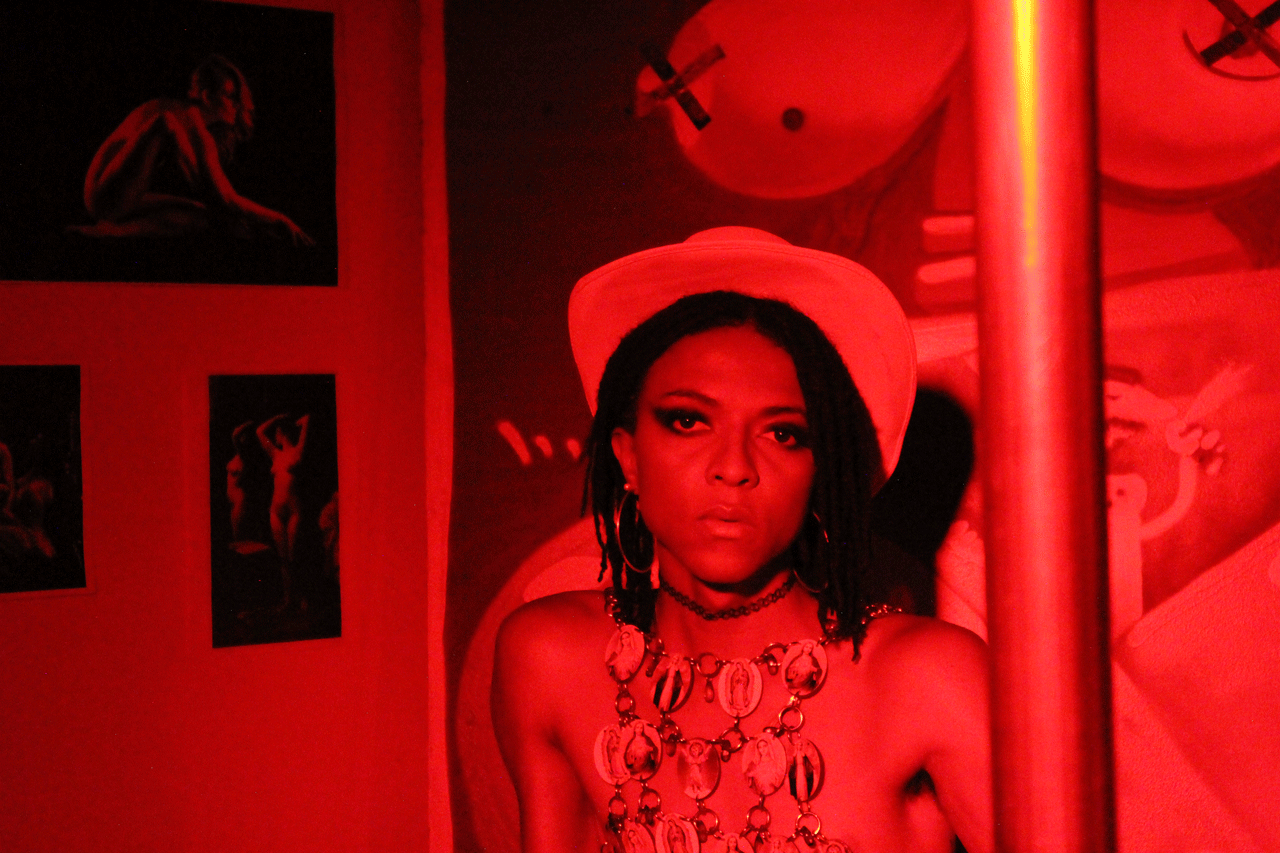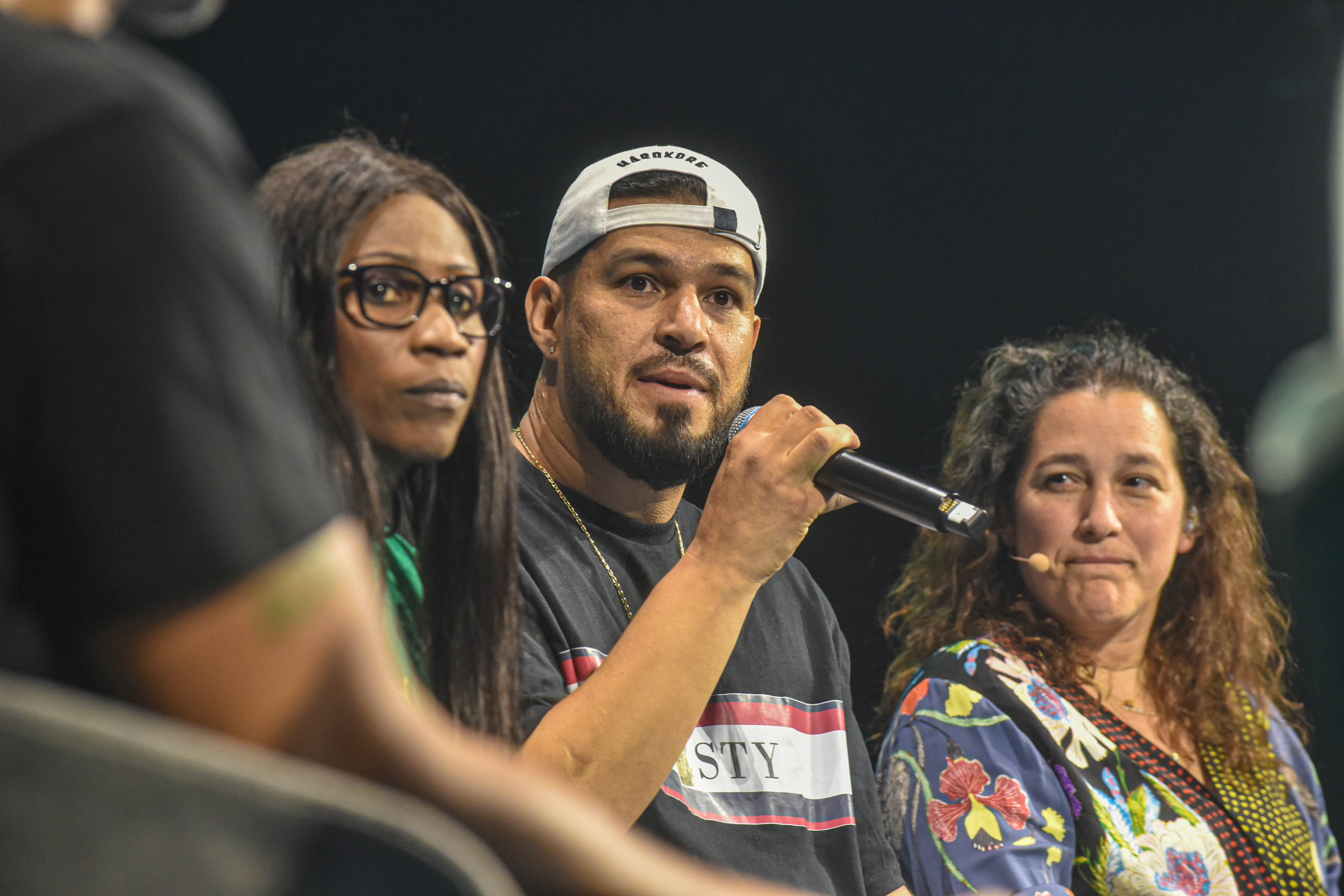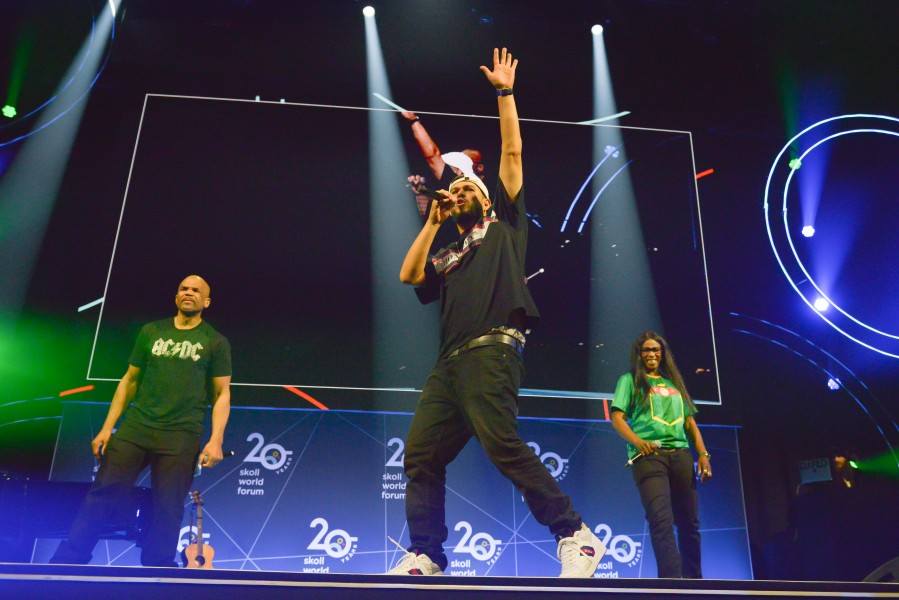This year marks the 50th anniversary of the hip hop movement. Born on the streets of New York City in the 1970s, hip hop has since spread to all corners of the globe amplifying the voices of youth and others from marginalized communities, raising awareness about societal injustice and inequity, and acting as a transformative agent of change. To honor hip hop and its contributions to the struggle for justice, truth, and equality, the Skoll Foundation hosted a panel discussion and concert event featuring hip hop artists and activists as part of its 20th World Forum held in April in Oxford, United Kingdom.
The event brought together the cofounder of the legendary rap group Run-DMC Darryl McDaniels, Senegalese rapper and activist Sister Fa, founder of Hip Hop Public Health Dr. Olajide Williams, and Colombian rapper and producer Ali aka Mind for a lively discussion. The artists also performed. ICTJ, which received the Skoll Award for Social Innovation in 2009 and has partnered with the Skoll Foundation since, invited Ali aka Mind as a representative of Rexistencia Hip Hop, an artistic mentorship and creation lab led by ICTJ’s office in Colombia and the Latin American media outlet and foundation Cartel Urbano.
Many marginalized populations today, especially those in countries with legacies of gross human rights violations, still grapple with poverty, inequality, social exclusion, and police brutality. For those living in these communities, particularly young people, hip hop helps affirm their dignity in the face of discrimination and serves as an outlet of creative expression and cultural resistance. “We cannot choose where we are born nor who our parents are,” asserted Ali aka Mind during the panel discussion. “But we can always choose to effect positive changes in our surroundings.”
Through its initiatives in several countries, including The Gambia and Côte d'Ivoire, ICTJ has learned that hip hop can be a powerful and effective way to engage young people in transitional justice issues and encourage their participation in ongoing processes. In Colombia, ICTJ cohosted a four-day international hip hop encounter in November 2020, which brought together artists, musicians, and activists from across Latin America and Africa to reflect on hip hop’s role in uncovering truth, preserving memory, and resisting violence and oppression. Art and cultural expressions can help a society deal with the consequences of gross human rights violations by reaching a segment of the population that may not have otherwise known the full extent of past abuses or paid attention to mechanisms put in place to address them.

Rexistencia Hip Hop
“Rap has embraced us all. It saved us, gave us purpose, and set our lives on a steady course,” explained el Checho, a member of the Colombian hip hop group Callejón Verset. Like el Checho, millions of young people all over the world have found themselves in hip hop music. And through it, they have learned about historical and ongoing injustices and been inspired to peacefully resist oppression and demand justice and positive social and political change in their communities and countries.
Callejón Verset is one 12 Colombian artists selected to participate in Rexistencia Hip Hop, an artistic mentorship program led by ICTJ and Fundación Cartel Urbano. The initiative, which took place between July 2021 and February 2022, provided the artists with four personalized training sessions and follow-up from one of 10 mentors, including Ali aka Mind who served as the leader mentor. The mentors offered instruction on sound production and digital content creation, and shared best practices for community building and using social media channels as well as important information on copyright, contracts, and other tools. Each artist or group also received a $2,000 grant.
In total, Rexistencia Hip Hop helped the participating artists create more than 24 songs and produce three albums (one LP and two EPs), nine music videos, two documentary films, a book, and merchandise.
Rapper El Kalvo used the grant money to publish his book, Algarabías, about the resilience of the hip hop community. “It shows we can learn from the negative and complex situations we have lived [through] and come back stronger on the other side,” he said.

Through their music, many of the artists try to inspire young people and warn them about the dangers of belonging to criminal gangs and problematic drug use. In doing so, they are resisting the recurring violent dynamics common in their communities and promoting change at the local level.
One of these artists is Roll the Voice, a hip hop crew whose members have disabilities, some of which are the result of violence. They use hip hop to share their experiences with discrimination, advocate for peaceful resistance, and create community around art.
Another artist is LoMaasBello, a trans musician from Buenaventura, a port city on Colombia’s Pacific coast. In her music, she explores the challenges and being Black, queer, and from an outer region.
At the end of Rexistencia Hip Hop, the artists launched the work they created in their communities, reflecting the importance of local partnerships and community building in hip hop culture. They also shared their projects with one another at a private event as a way to help build a network for future projects. For rapper MC Saya, the initiative was significant. “[Rexistencia Hip Hop] motivates me because it is very inclusive,” she said. “You can feel the diversity of rap. All the struggles we go through can become collective or individual songs, and that makes us strong somehow.”

Cultural Transformation
“The whole importance of hip hop was transformation. The artists didn’t create with record deals in mind, but to change the mental, physical, spiritual, economic, and political systems of the cities they lived in,” asserted Darryl “DMC” McDaniels moments before beginning his performance at the Skoll World Forum’s closing ceremony.
ICTJ believes that artists and musicians can powerfully articulate the stories of victims of human rights violations, the social and economic hardships and violence with which they and other marginalized populations often deal on a daily basis, and their desire for justice and greater opportunities. Their artwork can have a profound and lasting impact, sparking vitally important, victim-centered social dialogue, and ultimately change.
“Rappers must stand for vulnerable populations who also belong to our society,” said Senegalese rapper Sister Fa during the forum’s panel discussion. Sister Fa has used hip hop music to shine a light on the horrific practices of female genital mutilation and child marriages in West Africa.
The artists’ deep and emotional reflections at the forum were matched only by the infectious rhythms and vibrancy of the music they performed. Hundreds of attendees, including political leaders, experts, and representatives from civil society organizations, clapped and moved to the rhythms of Ali aka Mind, Sister Fa, and Darryl McDaniels. Their music and lyrics, about struggles in countries far from one another and sung in different languages, represented at once the local and global dimensions of hip hop culture. Hip hop and the conversations it kindles about injustice, inequity, and exclusion can help societies develop the solutions and tools to address the root causes, prevent the recurrence of violence, and a build more peaceful and just society—one beat at a time.
________
PHOTO: Colombian rapper and producer Ali aka Mind takes center stage during a performance at the Skoll World Forum's closing plenary on April 14, 2023, in Oxford, United Kingdom. (Joanna Madziarska/Skoll Foundation)
